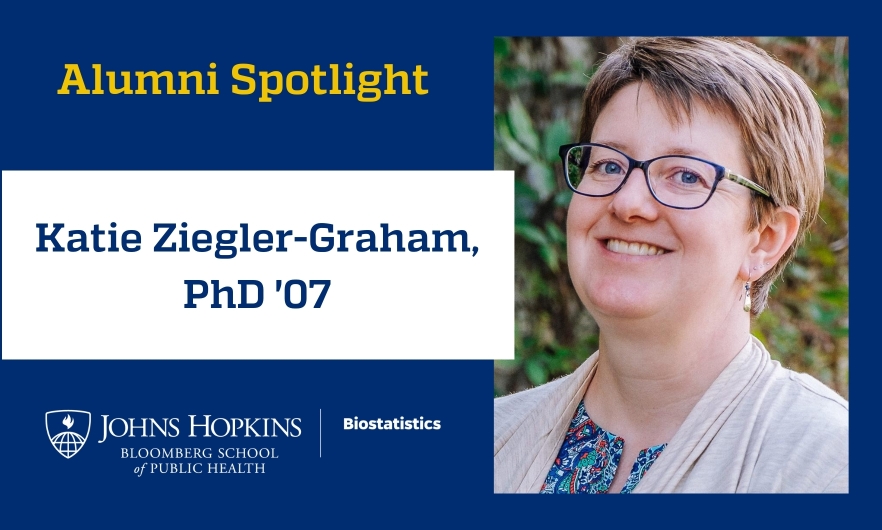Katie Ziegler-Graham, PhD '07
Katie Ziegler-Graham, PhD '07, is currently an associate professor in the Department of Mathematics, Statistics and Computer Science at St. Olaf College in Minnesota.

Katie Ziegler-Graham, PhD '07, is currently an associate professor in the Department of Mathematics, Statistics and Computer Science at St. Olaf College in Minnesota. Katie wrote her thesis, "Exploratory Inference," under the direction of Charles Rohde.
How did you get interested in the field of biostatistics? What was your background before enrolling at Hopkins?
I was always very interested in the sciences, but never felt like the lab was the right place for me. I was a math major at the College of Wooster and really like the idea of being able to combine my experience in mathematics with my interest in science. I had tried graduate school for a bit right after graduating from college, but it wasn’t a very good fit for me. I worked for a few years as an actuarial analyst before coming to Hopkins.
Describe your current position and responsibilities in a way that will inform prospective students about career opportunities in biostatistics.
I am an assistant professor at St. Olaf College in Northfield, Minnesota. My primary role at the college during the academic year is teaching. The statistics program and mathematics major at St. Olaf are very large for a small liberal arts college, so I have the opportunity to teach a wide variety of classes and work with a great group of statistical educators. I also get to work with students and engage them in collaborative undergraduate research. My typical day during the school year involves teaching, holding office hours, meeting with research students and going to meetings. I’m able to carve out some time in my week to work on some collaborative research and my own research to keep things moving so that when I have a break from teaching I can make progress on my projects.
How did Johns Hopkins Biostatistics prepare you for your career? What aspects of the program did you find most useful?
Hopkins certainly prepared me exceptionally well in technical areas. I have a broad background from coursework and research opportunities that allows me to teach any statistics course offered at St. Olaf and feel comfortable engaging in a wide variety of research on campus. The emphasis on teaching excellence in biostatistics at Hopkins has made the biggest impact on my career. I got to observe and participate in classes with exceptional teachers. The emphasis on communication, not just statistical competence, has also been very influential as I think about what skills I want students to have when they graduate from college.
What are your favorite memories of your time at Johns Hopkins Biostatistics?
My favorite memories are from class (with the great friends I made in my cohort), and the great faculty, teachers, happy hours, retreats and holiday parties.
Is there any other information about your experience at Hopkins that would be useful for prospective students?
I look back on my graduate experience at Hopkins with great fondness. I feel very fortunate to have been surrounded by such a supportive group of faculty and fellow students. Baltimore was a great place to be a graduate student. Not only is it an accessible and affordable place to live, there is a lot going on – with lots of great places to eat! I am always so happy to hear when students are considering Hopkins for graduate school!
